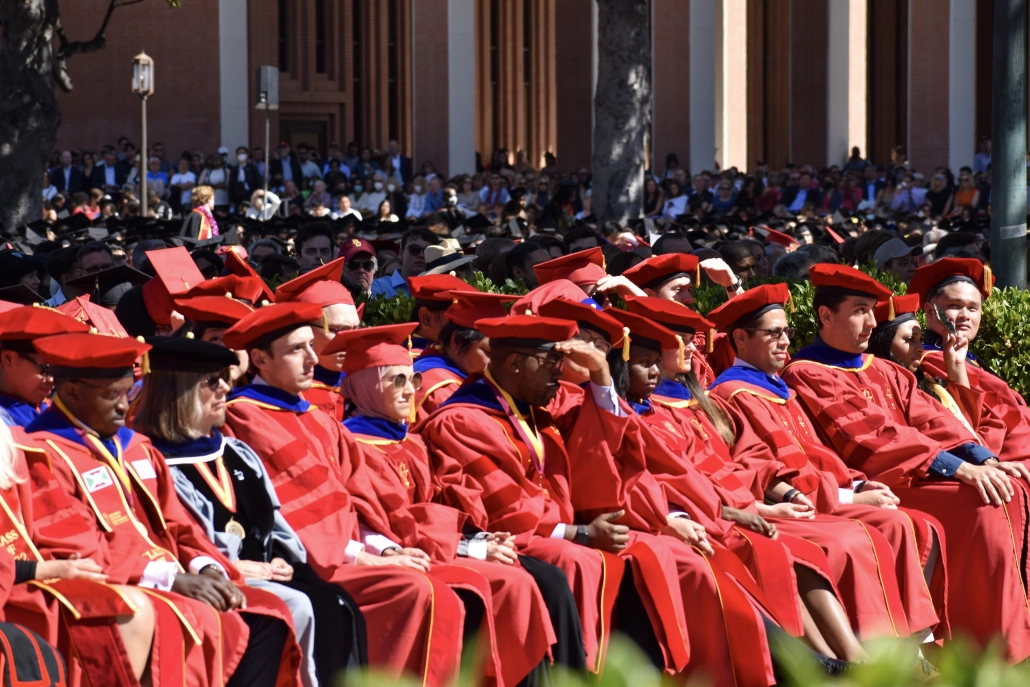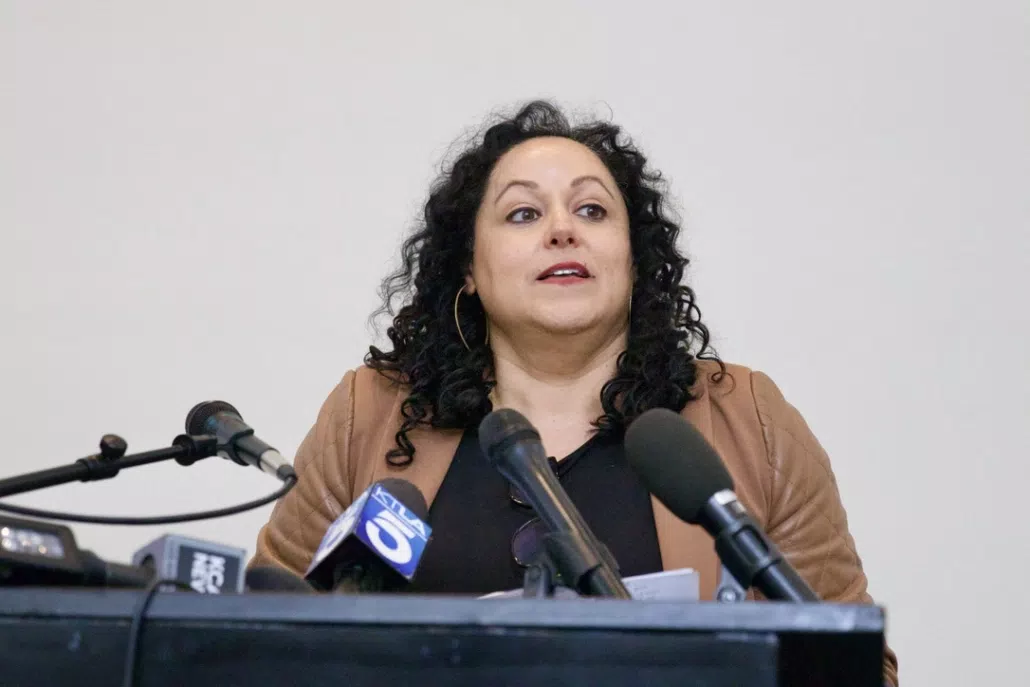‘They took away everything’: USC cancels main commencement
In a decision graduating students and faculty called “frustrating” and “disappointing,” USC will not hold a general commencement ceremony in May, citing “new safety measures.”
In a decision graduating students and faculty called “frustrating” and “disappointing,” USC will not hold a general commencement ceremony in May, citing “new safety measures.”

The University will not hold a “main stage” commencement ceremony this May, USC Academic Events announced in a communitywide statement Thursday afternoon, citing insufficient time to carry out “new safety measures.” Individual ceremonies for USC’s 23 schools and colleges, along with smaller celebrations, will continue as scheduled.
“We understand that this is disappointing; however, we are adding many new activities and celebrations to make this commencement academically meaningful, memorable, and uniquely USC,” the statement read, noting the traditional celebratory release of doves and performances by the Trojan Marching Band.
Academic Events also announced that tickets will be required for access to campus and all ceremonies May 8-11. Graduating students can reserve tickets for themselves and up to eight guests.
The decision came after the University barred Valedictorian Asna Tabassum from speaking at the ceremony, which draws roughly 65,000 attendees, after receiving threats from pro-Israel groups stemming from anti-Zionist content in a link in Tabassum’s Instagram bio. In his announcement of the speech cancellation, Provost Andrew Guzman wrote that “tradition must give way to safety” and that the decision had “nothing to do with freedom of speech.”
Four days later, the University “released” the other outside commencement speakers, including director Jon M. Chu, in a redesign meant to “keep the focus on our graduates,” an April 19 University statement read. Escalating ceremony reconfiguration ended in the main commencement being scrapped altogether, much to some students’ dismay.
Ashley Tobias, a senior majoring in theater, was in class when the email announcing the ceremony cancellation hit inboxes. As one student read the statement aloud, the room fell silent, Tobias said.
“We needed to take a moment because some of the students were crying,” Tobias said. “It was a hard, hard thing to deal with.”
Like most college seniors, Tobias didn’t have a high school graduation in 2020. She had hoped to commemorate finishing college with all the pomp and circumstance she didn’t get four years ago — a celebration that the University’s decision deprived her peers of, she said.
“They have taken everything, not just from the students who are graduating, but from the students whose voices desperately need to be heard from our valedictorian who they chose,” said Tobias, who said she’ll walk the stage at the School of Dramatic Arts’ satellite ceremony for her family and “all the people who came before.”
The ceremony cancellation didn’t come as a surprise for Annie Wensley, a graduate student studying public policy who is graduating this May, after the speaker cancellations and releases. Her reaction was “mixed,” she said, as she balanced her belief that “all eyes should be on Palestine” with the broken expectation of a full-fledged commencement.
“Celebrating at a time like this doesn’t feel right,” Wensley said. “Of course, when you go to school, you always anticipate that you will have a ceremony, but for me, that wasn’t what was important in the moment.”
The most “frustrating” part of Academic Events’ statement, Wensley said, was its mention that “demonstration and free speech zone policies” for the rest of May 10’s festivities would be posted. The demarcation, she said, felt like an attempt to sideline protesting students in favor of a “safe and orderly” ceremony.
“Of course, everyone deserves safety, but it does feel wrong to center the safety of students at USC — we’re very privileged to be at this institution — when students who are studying in countries like Palestine don’t have the same rights that we do and aren’t afforded the same safety,” Wensley said.
Students weren’t the only ones left reeling from the University’s decision to call off Tabassum’s valedictory address and the main commencement ceremony.

The 11 members of the Advisory Committee on Muslim Life who left the group last Friday, in protest of Tabassum’s speech being cut, had convened at the University Religious Center early Thursday afternoon to read their resignation letter at a press conference Thursday afternoon. Minutes before they began their press conference, the alert arrived in attendees’ inboxes.
Aisha Patel, the spokesperson for the ACML, pushed ahead with reading the letter, in which the former members wrote they were “extremely disappointed” that the committee “was not even considered worthy of consultation” before cutting Tabassum’s speech.
“In barring Asna [Tabassum’s] valedictorian speech, Muslims on campus have received a clear message,” the letter read. “Their university will not stand by them if they merely speak, or if they merely seem like they’re going to speak out, against genocide — let alone standing by Palestinians who are undergoing a genocide.”
In remarks afterward, Evelyn Alsultany, an associate professor of American studies and ethnicity said she was “dismayed and disappointed” by the decision to cancel the main commencement.
“It is a further escalation of suppressing free speech on campus and does not seem to be an illustration of putting safety first,” Alsultany said. “Yesterday, there were police officers on campus beating our students and arresting them. So, it raises the question as to whether safety is the primary [concern].”
In a statement to the Daily Trojan, the University wrote that it was “grateful for all who have served on the Muslim Life Advisory Committee,” and that, “despite these resignations, President Folt and her administration are committed to seeing the mission of the committee continued.”
At the end of the letter, Patel read the list of members who had resigned:
In remarks afterward, members said President Carol Folt responded to the resignation letter Thursday morning, asking them to reconsider — which they declined.
Editor’s note: Ashley Tobias served as an arts & entertainment writer, features writer and copy editor at the Daily Trojan from Fall 2020 to Spring 2022. Tobias is no longer affiliated with the paper.
We are the only independent newspaper here at USC, run at every level by students. That means we aren’t tied down by any other interests but those of readers like you: the students, faculty, staff and South Central residents that together make up the USC community.
Independence is a double-edged sword: We have a unique lens into the University’s actions and policies, and can hold powerful figures accountable when others cannot. But that also means our budget is severely limited. We’re already spread thin as we compensate the writers, photographers, artists, designers and editors whose incredible work you see in our daily paper; as we work to revamp and expand our digital presence, we now have additional staff making podcasts, videos, webpages, our first ever magazine and social media content, who are at risk of being unable to receive the support they deserve.
We are therefore indebted to readers like you, who, by supporting us, help keep our paper daily (we are the only remaining college paper on the West Coast that prints every single weekday), independent, free and widely accessible.
Please consider supporting us. Even $1 goes a long way in supporting our work; if you are able, you can also support us with monthly, or even annual, donations. Thank you.
This site uses cookies. By continuing to browse the site, you are agreeing to our use of cookies.
Accept settingsDo Not AcceptWe may request cookies to be set on your device. We use cookies to let us know when you visit our websites, how you interact with us, to enrich your user experience, and to customize your relationship with our website.
Click on the different category headings to find out more. You can also change some of your preferences. Note that blocking some types of cookies may impact your experience on our websites and the services we are able to offer.
These cookies are strictly necessary to provide you with services available through our website and to use some of its features.
Because these cookies are strictly necessary to deliver the website, refusing them will have impact how our site functions. You always can block or delete cookies by changing your browser settings and force blocking all cookies on this website. But this will always prompt you to accept/refuse cookies when revisiting our site.
We fully respect if you want to refuse cookies but to avoid asking you again and again kindly allow us to store a cookie for that. You are free to opt out any time or opt in for other cookies to get a better experience. If you refuse cookies we will remove all set cookies in our domain.
We provide you with a list of stored cookies on your computer in our domain so you can check what we stored. Due to security reasons we are not able to show or modify cookies from other domains. You can check these in your browser security settings.
These cookies collect information that is used either in aggregate form to help us understand how our website is being used or how effective our marketing campaigns are, or to help us customize our website and application for you in order to enhance your experience.
If you do not want that we track your visit to our site you can disable tracking in your browser here:
We also use different external services like Google Webfonts, Google Maps, and external Video providers. Since these providers may collect personal data like your IP address we allow you to block them here. Please be aware that this might heavily reduce the functionality and appearance of our site. Changes will take effect once you reload the page.
Google Webfont Settings:
Google Map Settings:
Google reCaptcha Settings:
Vimeo and Youtube video embeds:
The following cookies are also needed - You can choose if you want to allow them:
